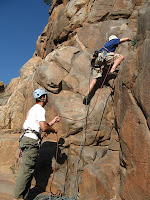Having spent the last 40 days (approximately) going through The Spiritual Exercises of Saint Ignatius, this post is a compilation of the lessons I have gleaned on spiritual formation as I analyzed the structure and content of this time-tested form of spiritual formation used by the Jesuits since the order’s inception. These 8 Attributes in Effective Spiritual Formation are not necessarily a comprehensive list to make a perfect church program, as the Exercises are more meditative than action orientated, but are those applicable elements which I found in Ignatius’ work. My posts from when I went through the Exercises are linked at the end.
Christian Spiritual formation should have . . .
Not only should we have the broad purposes of: loving God, loving each other, Christ-likeness, and holiness (Luke 10:27, 1 Peter 1:16), but specific times or acts of spiritual formation can have specific purposes. Spiritual formation should work more like the Pony Express than a carousel horse, with a goal and direction rather than looking fancy, but going in circles. Jesus taught everyone with parables, but he explained the parables privately to his disciples (Mark 4:34) because he was training them to continue the work of the kingdom after his ascension (Matthew 28:19). The purpose of The Spiritual Exercises of Saint Ignatius are “to help one to discard disordered attachments and through this means to order one’s life toward God, without coming to a decision from some disordered attachment pleasing more to self than to God” (Ganss, 1992). An example of how this may work in a local church is how College Wesleyan Church developed SoulShift to develop seven areas of maturity in its members.
Even though there is consistency, spiritual formation should not be boring. God is a mystery, so there should be surprises as we come to know him. A movie may follow a classic plot line, but still feel exciting when a director puts in a new twist. Jesus surprised his disciples by asking them to feed the 5,000, putting them in boats during storms, and washing their feet (Mark 6:36-37, Luke 8:22-25, John 13:5-7). When an exercitant is being led through the Exercises, they are not to know what meditation is coming next. One thing I do in discipleship or small groups is occasionally, and usually unexpectantly for disciples, forgo the lesson for the week in lieu of a fun fellowship activity (such as playing a game together) or ancient spiritual practice (celebrating the Passover).
It is always good to have a guide, but leaders should scaffold their disciples toward independence. The old proverb is true. Give a man a fish and you feed him for a day; teach a man to fish you feed him for life. Jesus preached with his disciples, sent out his disciples in twos to preach the kingdom, and after he ascended they had to rely on the Holy Spirit (Luke 10:1, Acts 1:8). By the end the Exercises the exercitant has developed certain disciplines of the mind and character traits that are now their own. In addition, one of the points of going through the Exercises is as training to take others through them. A new Christian may ask, “What should I read in the Bible?” A mature Christian should not only regularly read the whole Bible, but also know where to look to find particular teaching. One must remember, however, that mature independence does not mean separation from the community of believers.
Spiritual formation is not just about learning right doctrine or doing correct action. Sanctification is the result and continuing process of the new birth. God saves the whole person, body and spirit, so spiritual formation should deal with all of what makes us human: body, actions, desires, thoughts, emotions, intellect, imagination, and spirit. Not dealing with the whole person is like changing oil in a car, but not the filter. Jesus called his disciples to love God with all our heart, soul, mind and strength (Mark 12:30). Of course, not every spiritual discipline will act on every facet of our humanity. In the Exercises, Ignatius instructs in the imagination, the senses, attitudes and actions. Small groups should not just be about Bible knowledge, but restoring relationships. Discipleship should work towards not only the transformation of behavior, but also thoughts and attitudes.
A church may choose to use one program for congregational spiritual formation, but a church that is consistently reaching new people with the good news of salvation in Jesus Christ, and teaching those people to be disciples (Matthew 28:18-20) will have people at various stages of maturity. In addition, a local church may be multi-ethnic, multi-generational, and/or multi-socioeconomic. One model may not function with all the members if it includes only one curriculum and one teaching method. Unfortunately, politicians often have negative connotations associated with them, but good campaigners do know how to have one message, yet adapt the delivery for varied audiences. Jesus did not teach Nicodemus in the same manner as the Samaritan woman at the well (John 3:1-12, John 4:4-30). The Exercises are conducted “according to what is most helpful in view of the exercitant’s age, condition, and temperament” (Ignatius in Ganss, 1992). Spiritual formation in churches can do something that schools and universities cannot, allow a person to progress at their own pace.
Practicing spiritual disciplines do not themselves make people holy, but they can be a means of grace. Thus, every Christian should learn to practice at least some, because by them, we put ourselves in God’s way so that he can make us holy. If I go to the ocean and want to get wet, I can choose to stand on a rock and let the spray from the crashing waves hit me or I can wade out into the water. Jesus taught his disciples to pray, and lessons of giving (Luke 1:1-10, Mark 12:41-44). Ignatius’ Exercises focus on meditation and the reading of Scripture. Churches should encourage the practice of spiritual disciplines and partaking of the sacraments as means of grace.
The Spiritual Exercises of Saint Ignatius is part of a line writings and practice that Christians have used for personal and corporate spiritual formation. This collection of work includes: The Rule of St. Benedict, The Practice of the Presence of God by Brother Lawrence, Bonhoeffer’s Life Together, and The Pursuit of God by A. W. Tozer, among others. Yet all these owe their source to the Bible, the written word of God, his self disclosure to humanity. My daughter loves to use the tools of the post office, internet, and telephone to maintain her relationship with her grandfather, but letters and video chat do not compare to sharing ice cream face to face with her “Papa.” Jesus knew the Scriptures, used them in his personal life, and expounded them for others (Matthew 4:1-11, Matthew 5-7). Every meditation from week 2 through week 4 in the Exercises is focused on Scripture from the Gospels. According to a 2011 multi-country study conducted by LifeWay Research, Bible engagement is the number one attribute which “consistently show[s] up in the lives of believers who are progressing in spiritual maturity.” Thus, the reading, preaching, group study, and personal reflection on Scripture must not be neglected in spiritual formation.
——————————-
Staff Article. (2012, July 2). “Transformational Research Identifies Eight Attributes of Growing Disciples” LifeWay Research. LifeWay Christian Resources of the Southern Baptist Convention. Retrieved 2012, July 14 from http://www.lifeway.com/Article/transformational-research-attributes-of-growing-disciples
- My Spiritual Exercises
- The Spiritual Exercises: The Pre-work Warm-up
- The Spiritual Exercises: Week 1
- The Spiritual Exercises: Week 2 part 1
- The Spiritual Exercises: Week 2 part 2
- The Spiritual Exercises: Week 3
- The Spiritual Exercises: Week 4
- The Spiritual Exercises: Supplemental Matter
- 8 Attributes in Effective Spiritual Formation: Lessons Learned from Saint Ignatius
©2012 Paul Tillman















Paul – Your blog was excellent! I ended up reading all of your blogs that led up to this one as well – what a wonderful resource to help introduce people to Ignatius and his exercises. You did an excellent job of gleaning the critical components of spiritual formation as you drew attention to the exercises.
Although I generally say we start with Scripture – your placement of it last with emphasis on its foundational purpose in formation brought the reader full circle.
I attended a breakout at a conference this summer on adapting the exercises for children/families – a wonderful approach that contextualized the exercises not just for children but for today’s audience. Do you have any interest in taking the exercises to your people? Perhaps adapting them to fit your context?
– Colleen Derr
Thank you for the positive feedback. Yes, I hope to adapt this for use with others, perhaps for the season of Lent. It would be helpful to hear what you learned in contextualizing the Exercises, as that would not only help the growth process, but also break down the wall that this is something only for Roman Catholics.